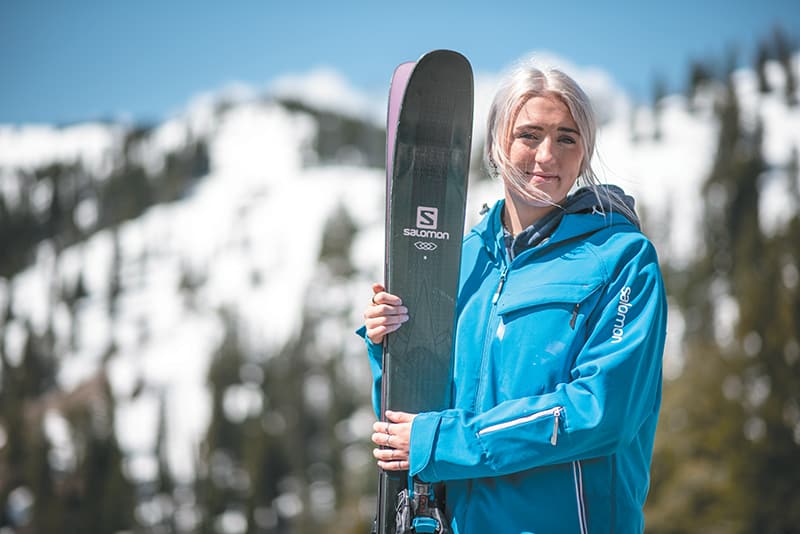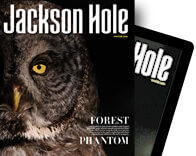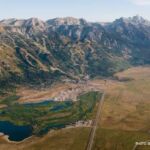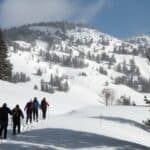Read The
Current Issue
Locals: Ellie Armstrong
Interview by Lila Edythe

Photo by Bradly J. Boner
THE FIRST TIME Ellie Snow Armstrong competed in a freeriding competition, she was 13 and her dad came along. Because Ellie’s dad is “Sick” Rick Armstrong, one of the pioneers of big mountain freeskiing, his presence at the comp was a huge deal. “The first several comps I did, I’d hear other skiers saying things like, ‘Oh my God, there’s Rick Armstrong,’” Ellie says. “At first they were intimidated by him.” By the end of her rookie season, though, it was Ellie who was the most intimidating Armstrong at the comps.
Ellie, who is 17 this winter, was born in Jackson in the middle of one of the biggest snowstorms of the 2002–2003 season. She skied for the first time around the same time she took her first steps. By age two, she was skiing between her dad’s legs off the Apres Vous lift at Jackson Hole Mountain Resort. She skied Corbet’s Couloir for the first time when she was seven. Armstrong was an alpine ski racer with the Jackson Hole Ski & Snowboard Club for nine years but says she “was ready for a change” when she turned 13. A friend suggested freeriding. Competing in the 12–14 age group, Armstrong won and, at the end of the season, placed third at the NorAm Championships. She hasn’t looked back since. “Ski racing is very competitive but freeriding is all about the fun,” she says. “Instead of trying to beat the person in front of you, the mountain is your canvas.”
Q: How would you describe your comp style?
EA: Hitting the biggest air. I’m always the girl who hits the guys’ line. There is always one really big feature that all the best guys try to hit, and I try to do that. I’m not as strong as they are, but I still like to prove that girls can do anything guys can.
Q: Do you have a favorite trick?
EA: I like backflips, but you’re not allowed to do them [in comps] until you’re 18.
Q: Does anything scare you?
EA: At the top of big lines, I am anxious and pumped up, but not scared. I don’t really have fear.
Q: What about outside of skiing?
EA: I don’t like oceans. I’ll go in, but it’s not my favorite; I’m terrified of sea life and I have a lot of medical history and I can’t get my ears wet.
Q: Have you hurt yourself since you’ve been competing in freeriding?
EA: I feel like injury is part of the sport. [Last season] I fractured my back—it was a compression fracture—and took six weeks off. After that, I went right back into competitions and felt something pop; then I was out for seven months. In this sport it is kind of what you sign up for. You have to expect the worst.
Q: Are you recovered now?
EA: I think I’m back to normal. [Last summer] I was out mountain biking and hitting everything.
Q: Ski racing is cut-and-dry: the racer with the fastest time wins. How is freeriding judged?
EA: On control, fluidity, style, and energy.
Q: Was it difficult to transition to freeriding from racing?
EA: Living in Jackson, with such good terrain, I’ve kind of been practicing it my entire life.
Q: Do you get to practice your run before it’s judged?
EA: We’ll inspect it once at most. Some comps don’t even allow that.
Q: So is your run in the competition all improv then?
EA: Never. I know exactly what my line will be when I start. If we can’t inspect it, I’ll look at it from the bottom and choose the features I want to hit and how I’ll connect them. Then, after I’ve visualized it, I’ll turn my back [to the mountain] and tell my dad or coach exactly what I’m going to do.
Q: And do you always end up doing what you have visualized?
EA: I’ve never missed a line. There are times when my dad has told me to go around features though.
Q: Fave lines at the village?
EA: I really like Bird in the Hand, and the Hobacks of course. The Alta Chutes are always fun.




